Difference between revisions of "Aluminum Thickness Tests"
| (14 intermediate revisions by the same user not shown) | |||
| Line 12: | Line 12: | ||
:1 Radiation Length of Aluminum is 8.897cm | :1 Radiation Length of Aluminum is 8.897cm | ||
| + | |||
| + | :1 million electrons incident on Tantalum, single file | ||
{| border="2" style="text-align:center;" |cellpadding="20" cellspacing="1 | {| border="2" style="text-align:center;" |cellpadding="20" cellspacing="1 | ||
| Line 34: | Line 36: | ||
Without photon physics active and vacuum in the tracker and chamber, I cannot say whether electrons are making it though the target and beamstop. | Without photon physics active and vacuum in the tracker and chamber, I cannot say whether electrons are making it though the target and beamstop. | ||
| + | ===Where are the <300KeV photons from?=== | ||
| + | |||
| + | :Tantalum thickness of 0.0508cm | ||
| + | |||
| + | :All electron physics turned on | ||
| + | |||
| + | :No photon physics turned on | ||
| + | |||
| + | :Chamber and Tracker matter is vacuum | ||
| + | |||
| + | :1 Radiation Length of Aluminum is 8.897cm | ||
| + | |||
| + | :1 million electrons incident on Tantalum, single file | ||
| − | + | :No beamstop present | |
{| border="2" style="text-align:center;" |cellpadding="20" cellspacing="1 | {| border="2" style="text-align:center;" |cellpadding="20" cellspacing="1 | ||
| Line 47: | Line 62: | ||
|} | |} | ||
| − | + | ====Conclusion==== | |
| − | + | It is easy to see in these images that adding in air to the simulation creates the low energy photons. Although this peak is not as pronounced or have anywhere near as many photons as when the beamstop is present, therefore it is a combination of air in the tracker/chamber and the presences of an aluminum beamstop that is responsible for the low energy photons. | |
| − | |||
=Photon Physics On= | =Photon Physics On= | ||
| Line 64: | Line 78: | ||
:1 Radiation Length of Aluminum is 8.897cm | :1 Radiation Length of Aluminum is 8.897cm | ||
| + | |||
| + | :1 million electrons incident on Tantalum, single file | ||
{| border="2" style="text-align:center;" |cellpadding="20" cellspacing="1 | {| border="2" style="text-align:center;" |cellpadding="20" cellspacing="1 | ||
| Line 103: | Line 119: | ||
:1 Radiation Length of Aluminum is 8.897cm | :1 Radiation Length of Aluminum is 8.897cm | ||
| + | |||
| + | :1 million electrons incident on Tantalum, single file | ||
{| border="2" style="text-align:center;" |cellpadding="20" cellspacing="1 | {| border="2" style="text-align:center;" |cellpadding="20" cellspacing="1 | ||
Latest revision as of 20:08, 18 October 2017
No Photon Physics
- Varying Aluminum beamstop thickness
- Tantalum thickness of 0.0508cm
- All electron physics turned on
- No photon physics turned on
- Chamber and Tracker matter is vacuum
- 1 Radiation Length of Aluminum is 8.897cm
- 1 million electrons incident on Tantalum, single file
| Aluminum Thickness | Photon Kinetic Energy Spectrum | Z Position of Photon Creation | Volume of Photon Creation |
| 8.897cm | 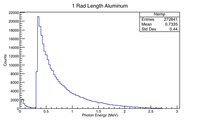 |
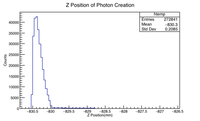 |
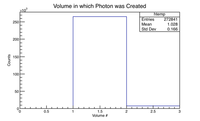
|
| 4.4485cm | 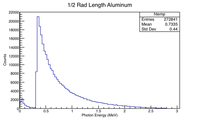 |
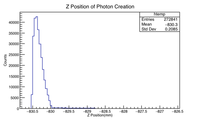 |
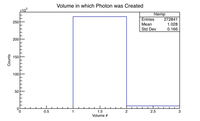
|
| 2.22425cm | 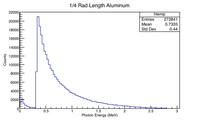 |
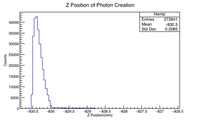 |
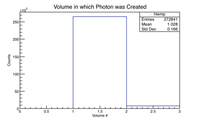
|
| 1.5875cm (5/8") | 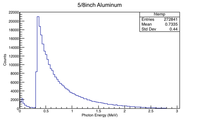 |
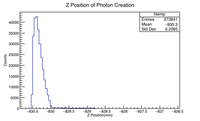 |
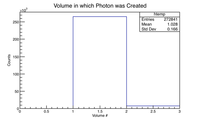
|
| 1.27cm (1/2") | 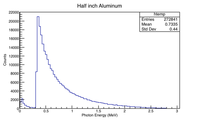 |
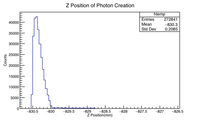 |
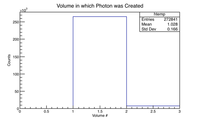
|
Note: Volume 1 = Target, Volume 2 = Beamstop, Volume 3 = Tracker, Volume 4 = Chamber, Volume 5 = else
Conclusion
Without photon physics active and vacuum in the tracker and chamber, I cannot say whether electrons are making it though the target and beamstop.
Where are the <300KeV photons from?
- Tantalum thickness of 0.0508cm
- All electron physics turned on
- No photon physics turned on
- Chamber and Tracker matter is vacuum
- 1 Radiation Length of Aluminum is 8.897cm
- 1 million electrons incident on Tantalum, single file
- No beamstop present
| Physics | Photon Kinetic Energy Spectrum (Vacuum) | Photon Kinetic Energy Spectrum (Air) |
| Photon Physics Off | 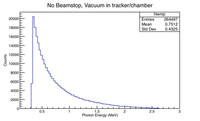 |
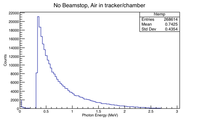
|
| Photon Physics On | 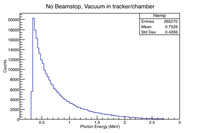 |
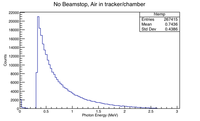
|
Conclusion
It is easy to see in these images that adding in air to the simulation creates the low energy photons. Although this peak is not as pronounced or have anywhere near as many photons as when the beamstop is present, therefore it is a combination of air in the tracker/chamber and the presences of an aluminum beamstop that is responsible for the low energy photons.
Photon Physics On
- Varying Aluminum beamstop thickness
- Tantalum thickness of 0.0508cm
- All electron physics turned on
- All photon physics turned on
- Chamber and Tracker matter is vacuum
- 1 Radiation Length of Aluminum is 8.897cm
- 1 million electrons incident on Tantalum, single file
| Aluminum Thickness | Photon Kinetic Energy Spectrum | Z Position of Photon Creation | Volume of Photon Creation |
| 8.897cm | 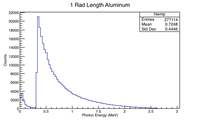 |
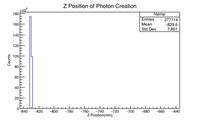 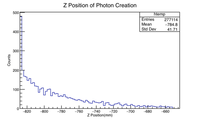 |
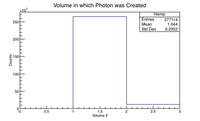
|
| 1.5875cm (5/8") | 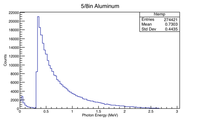 |
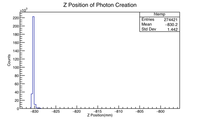 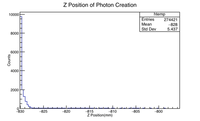 |
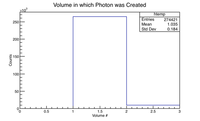
|
| 1.27cm (1/2") | 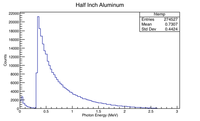 |
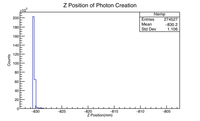 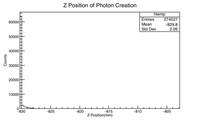 |
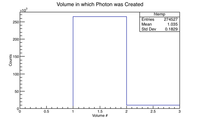
|
| 4.4485cm | 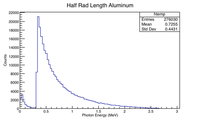 |
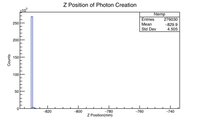 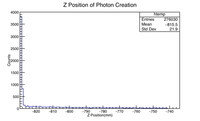 |
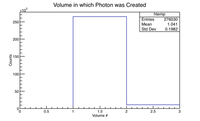
|
| 2.22425cm | 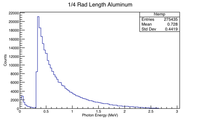 |
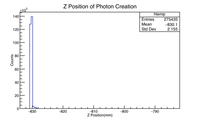 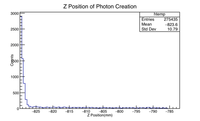 |
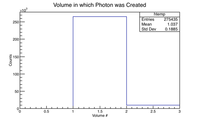
|
Note: Volume 1 = Target, Volume 2 = Beamstop, Volume 3 = Tracker, Volume 4 = Chamber, Volume 5 = else
Conclusion
Why is tail 16 cm long?
I am going to rerun the 1 rad length simulation to see if i get the same result which will help me determine if i had an error in which matter i used in tracker/chamber, etc.
Photon Physics On with Air in Chamber and Tracker
- Varying Aluminum beamstop thickness
- Tantalum thickness of 0.0508cm
- All electron physics turned on
- All photon physics turned on
- Chamber and Tracker matter is air (70% Nitrogen, 30% Oxygen)
- 1 Radiation Length of Aluminum is 8.897cm
- 1 million electrons incident on Tantalum, single file
| Aluminum Thickness | Photon Kinetic Energy Spectrum | Z Position of Photon Creation | Volume of Photon Creation |
| 8.897cm | 200px | 200px | 200px |
| 1.5875cm (5/8") | 200px | 200px | 200px |
| 1.27cm (1/2") | 200px | 200px | 200px |
| 4.4485cm | 200px | 200px | 200px |
| 2.22425cm | 200px | 200px | 200px |
- Note: Volume 1 = Target, Volume 2 = Beamstop, Volume 3 = Tracker, Volume 4 = Chamber, Volume 5 = else